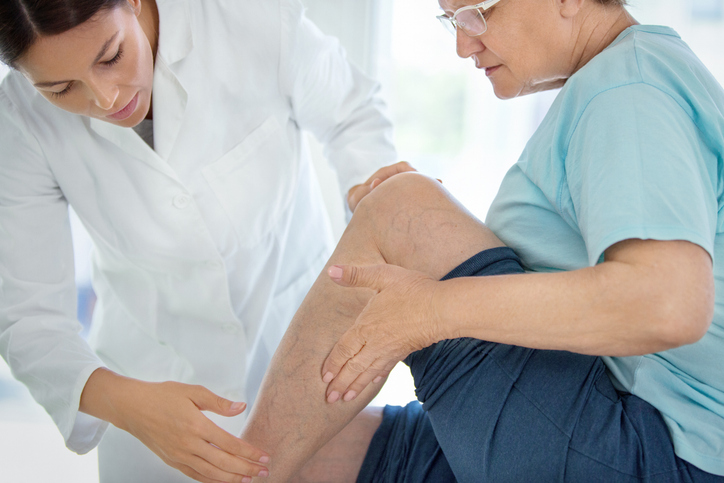It’s easy to ignore the occasional swelling or discomfort in your legs, especially after a long day on your feet. But what if those little annoyances are early signs of something more serious? Venous insufficiency, a condition where the veins struggle to return blood to the heart, can start quietly, often showing up as mild symptoms that we dismiss as fatigue or aging. However, if left unchecked, venous insufficiency can lead to more severe problems, like ulcers, blood clots, or even deep vein thrombosis. The key is recognizing the signs early on, so you can take action before the condition worsens.
Whether you’ve noticed achy, swollen legs or varicose veins that seem to have appeared out of nowhere, it’s important to understand what your body is trying to tell you.
Common Symptoms of Venous Insufficiency
At first, venous insufficiency might feel like a mild nuisance, but over time, it can progress and cause more significant issues. Here are some of the early signs to watch out for:
- Swelling in the Legs and Ankles: One of the first signs of venous insufficiency is swelling, especially at the end of the day. If you notice your ankles or legs feeling swollen, particularly after standing or sitting for long periods, it could be an early warning sign.
- Achy or Heavy Legs: If your legs feel tired, achy, or heavy, it’s often a result of blood not circulating properly. This sensation is usually worse after long periods of activity, like standing or walking.
- Varicose Veins: These are large, twisted veins that appear near the skin’s surface. Varicose veins are often a result of damaged valves in the veins, which prevent blood from flowing upward toward the heart. They may be the most obvious sign of venous insufficiency.
- Skin Changes: As blood flow decreases, your skin may begin to show signs of damage. You might notice a reddish or brownish discoloration, especially near the ankles. This is caused by blood pooling and can eventually lead to skin ulcers.
- Itchy or Irritated Skin: Poor circulation can also affect the skin’s health. If your legs feel itchy or irritated, it could be a result of venous insufficiency. The lack of proper blood flow reduces the amount of oxygen and nutrients reaching your skin, leading to dryness and discomfort.
- Leg Cramps: Unexplained leg cramps, especially at night, are another sign of poor circulation. If you’ve started experiencing cramps more frequently, it may be worth getting checked for venous insufficiency.
What Causes Venous Insufficiency?
There are several risk factors that can contribute to the development of venous insufficiency, and it’s important to be aware of these when assessing your own health:
- Age: As we age, our veins can lose elasticity, making it more difficult for them to carry blood back to the heart.
- Family History: Genetics play a role in vein health, so if your parents or grandparents suffered from varicose veins or venous insufficiency, you may be at higher risk.
- Obesity: Carrying excess weight puts additional pressure on your veins, increasing the likelihood of venous problems.
- Prolonged Standing or Sitting: Occupations or activities that require long hours of standing or sitting can reduce blood circulation, putting stress on your veins.
- Pregnancy: The added weight and hormonal changes during pregnancy can lead to swelling and other vein issues.
- Hormonal Changes: Hormonal fluctuations due to menopause or birth control can also increase the risk of venous insufficiency.
Complications of Untreated Venous Insufficiency
If left untreated, venous insufficiency can lead to serious complications that affect your quality of life:
- Venous Ulcers: Open sores can develop on the skin, especially around the ankles, due to poor circulation.
- Blood Clots: In severe cases, blood can pool in the veins, increasing the risk of clots, which can break free and travel to the lungs, causing a pulmonary embolism.
- Chronic Pain: Over time, the discomfort can become constant, making everyday activities difficult.
- Skin Damage: As blood backs up in the veins, it can cause permanent skin damage, leading to permanent discoloration and scarring.
What to Do if You Notice These Symptoms
If you start experiencing any of the symptoms listed above, it’s important to consult a healthcare provider. Early detection and treatment can make a significant difference in managing venous insufficiency. Treatments can range from lifestyle changes, such as exercise and weight management, to medical procedures like vein stripping or laser therapy. The goal is to improve circulation, alleviate symptoms, and prevent the condition from worsening.
How Can The Vascular Care Group Help?
At The Vascular Care Group, we understand how venous insufficiency can impact your daily life, and we’re here to provide the treatment and care you need. With convenient locations across New England, our team of experienced vascular specialists uses the latest techniques to assess and treat your condition. Whether you’re dealing with swelling, varicose veins, or more severe symptoms, we offer a range of solutions tailored to your needs.
If you notice any signs of venous insufficiency, don’t wait for the condition to progress. Contact us today to schedule a consultation and take the first step toward better vascular health. With our compassionate, comprehensive care, we’ll help you get back on track and move with ease.





